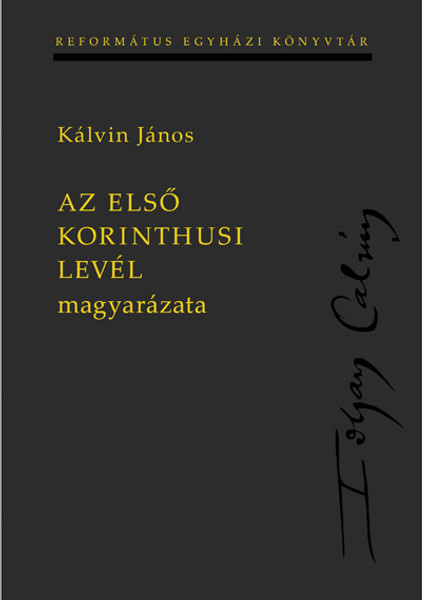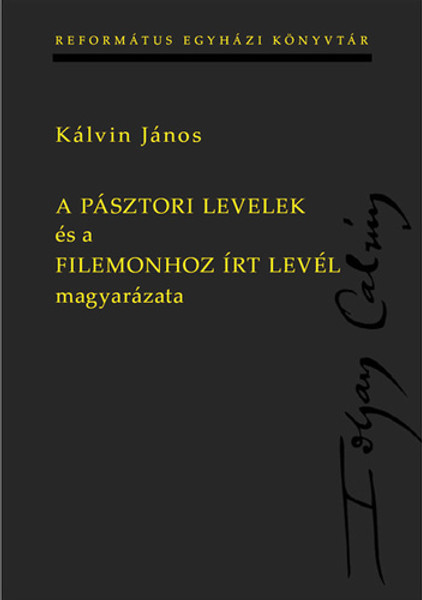Description
Az Urat keressétek, akkor élni fogtok! Magyarázat Ámósz könyvéhez by John Calvin / Seek the Lord, You Will Live! - Commentary on Amos
Overview:
Az Urat keressétek, akkor élni fogtok! is the Hungarian translation of John Calvin’s Commentary on the Book of Amos. This detailed exposition reflects Calvin's rigorous theological analysis, exploring the prophetic messages of Amos in relation to God’s justice and mercy. The commentary emphasizes the need for repentance and seeking the Lord as the pathway to life and restoration. Calvin’s writing, rooted in Reformed theology, remains relevant for modern readers, offering spiritual guidance and historical context that deepens the understanding of Amos’s prophetic words. This work is a valuable resource for pastors, theology students, and anyone seeking a profound biblical study.
Product Features:
- Format: Paperback
- Pages: 256
- ISBN-13: 978-9633009031
- ISBN-10: 9633009030
- Publisher: Kálvin
- Publication Year: 2002
- Language: Hungarian
Interesting Facts:
- Author Background: John Calvin, one of the principal figures of the Protestant Reformation, was a French theologian, pastor, and reformer. His works, including The Institutes of the Christian Religion, shaped the development of Calvinism and influenced countless Christian denominations worldwide.
- Amos, a minor prophet in the Old Testament, prophesied against the injustices of Israel and called for repentance. Calvin’s commentary emphasizes the prophetic call to righteousness, justice, and the consequences of ignoring God's commands.
- This commentary is part of Calvin’s extensive work on biblical exegesis, providing theological insights that have been foundational to Reformed and Presbyterian traditions.
- The book is part of a larger series of Calvin’s commentaries on the prophets, continuing his legacy of deep scriptural engagement and theological reflection.
Publishers:
- Publisher: Kálvin
- Publication Year: 2002
We value your feedback! Share your experience with this product to help others make informed decisions. Your review is important to us!
Hashtags:
#AmosCommentary #JohnCalvin #ReformedTheology #BiblicalExegesis #OldTestamentStudies #HungarianTranslation #KálvinPublishing #PropheticBooks #SeekTheLord #JusticeAndRepentance
Hungarian Translation:
Áttekintés:
Az Urat keressétek, akkor élni fogtok! John Calvin Ámósz próféta könyvéhez írt magyarázatának magyar fordítása. Calvin részletes teológiai elemzése bemutatja Ámósz prófétai üzeneteit Isten igazságosságáról és irgalmáról, hangsúlyozva a bűnbánat és az Úr keresésének fontosságát, mint az élet és helyreállítás útját. Calvin írásai, amelyek a református teológia alapjaira épülnek, a mai olvasók számára is relevánsak, mélyebb bibliai megértést nyújtva Ámósz prófétai szavaihoz. Ez a mű hasznos eszköz lelkipásztorok, teológiai hallgatók és mindenki számára, aki mélyreható bibliai tanulmányra vágyik.
Érdekes tények:
- Szerzői háttér: John Calvin a protestáns reformáció egyik meghatározó alakja, francia teológus, lelkipásztor és reformátor volt. Munkái, köztük a Keresztény vallás rendszere (Institutes), alapvető hatással voltak a kálvinizmus fejlődésére, és számos keresztény felekezetre világszerte.
- Ámósz, az Ószövetség egyik kisprófétája, Izrael igazságtalanságai ellen prófétált, és bűnbánatra hívott. Calvin magyarázata hangsúlyozza a prófétai felhívást az igazságosságra és a szentségre, valamint annak következményeit, ha Isten parancsait figyelmen kívül hagyjuk.
- Ez a kommentár Calvin átfogó bibliamagyarázatának része, amely a református és presbiteri hagyományok teológiai alapjait képezi.
- A könyv Calvin prófétai kommentárjainak sorozatába illeszkedik, és továbbviszi a mély szentírási elkötelezettség és teológiai reflexió hagyományát.































